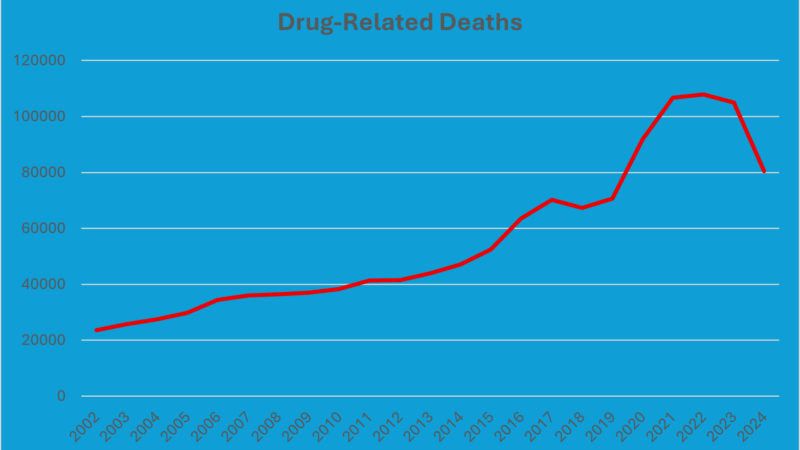By Trump's Logic, Biden Deserves Credit for a Dramatic Drop in Overdose Deaths
That logic implausibly assumes presidents have the power to curtail substance abuse by attacking the drug supply.

During the last year of Donald Trump's first term as president, drug-related deaths in the United States rose by 30 percent—the largest annual increase ever recorded. During Joe Biden's final year as president, according to preliminary estimates reported last week, that death toll fell by 27 percent—another record.
On the face of it, Biden did a far better job of waging the war on drugs than Trump. But that conclusion credits presidents with much more power than they actually have to curtail substance abuse by attacking the supply of illegal drugs—an impossible mission doomed by the economics of prohibition.
Attorney General Pam Bondi recently claimed the Trump administration had "saved…258 million lives" by intercepting shipments of illicit fentanyl. While Bondi's risible math broke new ground, it reflected her boss's simpleminded faith in the war on drugs.
"I'm going to create borders," Trump promised during his 2016 campaign. "No drugs are coming in….Believe me, I will solve the problem."
Trump did not, in fact, solve the problem. By the end of his first term, the annual number of drug deaths was 44 percent higher than it was the year before he took office.
That sorry record did not stop Trump from bragging, during his 2024 campaign, that "we took the drug and fentanyl crisis head on" and "achieved the first reduction in overdose deaths in more than 30 years." He was referring to a 4 percent drop in 2018, after which the death toll resumed its upward trend.
During his first State of the Union address in 2022, Biden promised that he would "beat the opioid epidemic" and "stop the flow of illicit drugs." Yet the annual number of overdose deaths reached a record high of nearly 108,000 on his watch.
Still, if Trump can claim credit for the 4 percent drop in 2018, it seems only fair to praise Biden for the similar drop (3 percent) in 2023 and the much bigger drop in 2024. Likewise, if Biden deserves blame for allowing drug deaths to reach the highest level ever seen, the same logic condemns Trump, who presided over the unprecedented jump seen in 2020.
Something may be wrong with that logic, which ignores the larger forces at work in both cases. When it became clear that overdoses had risen dramatically in 2020, experts surmised that it had something to do with the social and economic disruption caused by the COVID-19 pandemic and the government's response to it—an impression confirmed by subsequent research.
A 2024 study found that "volatile drug use during the COVID-19 pandemic was common, appeared to be driven by structural vulnerability, and was associated with increased overdose risk." Another study published the same year concluded that "policies limiting in-person activities significantly increased" drug death rates.
If pandemic-related disruption drove the 2020 overdose spike, the return to normal life seems like a plausible explanation for subsequent decreases, although the death toll was still about 14 percent higher last year than it was in 2019. Last fall, University of North Carolina drug researcher Nabarun Dasgupta and his colleagues suggested other possible factors, including wider availability of naloxone, an opioid antagonist that quickly reverses overdoses.
Dasgupta et al. deemed it "unlikely" that attempts to block the drug supply—the solution favored by Trump and Biden, echoing a long line of politicians—had played a significant role in reducing overdoses. That explanation, they noted, was inconsistent with the falling retail prices they had observed.
Far from reducing drug-related harm, prohibition aggravates it by creating a black market where drug composition is highly variable and by encouraging the sale of especially potent substances such as fentanyl, which are easier to smuggle. The crackdown on prescription opioids magnified those hazards by driving nonmedical users to replace reliably dosed pharmaceuticals with substitutes that were much more dangerous.
Since Biden and Trump both supported those policies, they both deserve blame for the predictably perverse consequences.
© Copyright 2025 by Creators Syndicate Inc.
